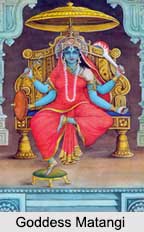 Goddess Matangi is the Hindu Goddess of inner thought and wisdom. Goddess Matangi is the ninth Goddess among the Ten Mahavidyas. She is a primary form of the all-powerful Goddess. The Goddess is Siddha Vidya or Tantra personified, thus commanding occult power. Goddess Matangi is associated with the full moon, the "night of intoxication". The Mahavidyas represent some or other manifestation of the Divine Mother. She grants control over poetry and music in particular. She is the Goddess of beauty, marriage, happy married life and son, and material gains.
Goddess Matangi is the Hindu Goddess of inner thought and wisdom. Goddess Matangi is the ninth Goddess among the Ten Mahavidyas. She is a primary form of the all-powerful Goddess. The Goddess is Siddha Vidya or Tantra personified, thus commanding occult power. Goddess Matangi is associated with the full moon, the "night of intoxication". The Mahavidyas represent some or other manifestation of the Divine Mother. She grants control over poetry and music in particular. She is the Goddess of beauty, marriage, happy married life and son, and material gains.
Iconography of Goddess Matangi
Goddess Matangi has dark emerald complexion and has three eyes. She is depicted in various forms. She is depicted as green or blue holding a Veena, Knife and a Skull. At times she is seen seated on a corpse, holding a skull and a bowl of blood, with untidy hair. Matangi is surrounded by nature especially birds, green and red parrots which represent a Guru.
Origin of Goddess Matangi
The first myth of Matangi associates her with Ucchista Matangini. Once, Lord Vishnu and Goddess Lakshmi visited Lord Shiva and Goddess Parvati where the former presented the later with food items. While eating few pieces dropped on the floor and from those leftovers a maiden arose who was endowed with good attributes. The maiden came to be known as "Ucchista Matangini".
The second myth associated with the origin of Matangini has been derived from the "Pranatosini Tantra". When Parvati did not return from her father Daksha"s abode, Lord Shiva disguised himself as an ornament maker and went to her. To test her faithfulness, he asked her for lovemaking. Parvati became furious but stopped upon realizing his identity. Later Parvati disguised herself as a huntress and approached Shiva. Lord Shiva was so impressed with her that he even made love with her. The Goddess requested to Shiva that as they made love in the form of a Chandalini, this form would last forever and will be named as "Ucchista Chandalini".
The third myth has been derived from the "Swatantra Tantra". According to legend, once Sage Matanga assumed austerities to achieve the power to suppress all creatures. He practiced his asceticism for thousands of years. Finally, Goddess Tripura Sundari appeared and emitted rays from her eyes from which Goddess Kali emerged. Kali put on a greenish complexion and took the form of Raja Matangini. With the help of the Goddess, Matanga fulfilled his desire to control all creatures.
Goddess Matangi in Buddhism
Goddess Matangi has been associated in Buddhism and also finds mention in the "Divyavadana", a Buddhist collection of stories concerning previous lives of Buddha that was probably written around 250-300 C.E. These texts relate Matangi as the daughter of elephant hunter king Matang.
Goddess Meenakshi Amman at Madurai is worshipped as "Mathangi". "Mattangi" is also the name of the recluse woman on whom the head of Renuka was placed by Parashurama when he could not find the body of his mother. Since then she has been worshipped as a tutelary deity under the name of "Ellamma".









